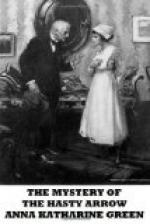As has happened before, it proved to be easily explainable when once the conditions were known. The room to which he led them was that on the upper story marked H on Chart Two. It was devoted, like one or two others near it, to a line of famous paintings at once the hope and despair of young girl copyists. The one most favored for this purpose hung just behind the door “X,” which, half-open as they found it, made with the easel, the canvas upon it and an apron hanging carelessly over all, an impromptu screen behind which a man crouched in misery on the copyist’s stool might easily remain unnoticed by anyone passing hurriedly by him.
And thus vanished one hindrance to a full belief in young Travis’ story.
But a greater one remained. The bow! the bow found behind the tapestry at the edge of which he had stood in timorous hiding! In the hope that a shock might startle him into some admission which would give a different aspect to the case, they now led him back to this place of first concealment. He was showing strain by this time, and no delay was made to press their point. Giving the tapestry a pull, the Coroner bade him tell what he saw behind it.
The answer came with much emotion.
“The bow! The bow which sped the arrow which killed Miss Willetts. I do not want to see it. It hurts me—hurts me physically. Let me go, I entreat.”
“Mr. Travis,” urged the Coroner as they again emerged upon the open gallery, “you have said that there was no one with you in the section where you stood. If that was so, how came this bow to be where you have just seen it?”
A bewildered look, a slow shake of the head and nothing more.
“Did you know it was there? Did you see it thrown there?”
“No, I saw nothing. I am an honest man. You may believe me.”
The Coroner scrutinized him closely but not unkindly.
“We shall know before night who handled that bow, Mr. Travis. It carries its own clue with it.”
A gleam of unmistakable joy lighted up the Englishman’s features.
“I am glad,” he cried. “I am glad.”
Coroner Price was a man of experience. He recognized the ring of truth in the Englishman’s tones, and saying no more, led the way from the gallery.
A few minutes later he was on the lower floor. He had a short conversation with the two doormen; then he proceeded to the telephone and called up the Universal.
The result was startling.
Asked if the name of Rupert Henry Travis, Hertfordshire, England, was on their register, the answer was yes.
“The date of his arrival?”
“Early this morning.”
“Any other arrivals to-day from the other side?”
“Yes, a Madame Duclos and a Miss Willetts.”
The Coroner’s tone altered. So much of the stranger’s story was true, then.
“Will you connect me with Madame Duclos. I have important news to give her. Some woman had better be with her when she receives it.”




